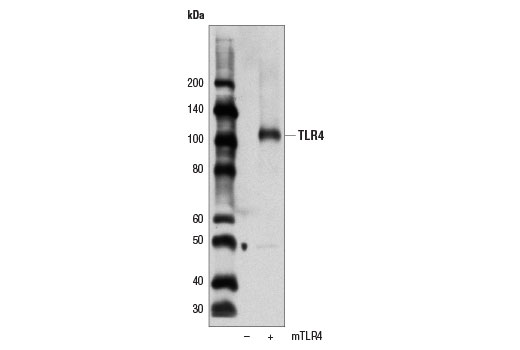 全部商品分类
全部商品分类


1/2
产品介绍
产品信息
荧光素标记
来源纯化
Monoclonal antibody is produced by immunizing animals with recombinant mouse Toll-like receptor 4 protein.

宿主
Rabbit

商品描述
Product Usage Information
| Application | Dilution |
|---|---|
| Western Blotting | 1:1000 |

同种型
Rabbit IgG

分子量
100-135

应用
目标/特异性
Specificity/Sensitivity
Toll-like Receptor 4 (D8L5W) Rabbit mAb recognizes endogenous levels of total Toll-like receptor 4 protein.
Species Reactivity:
Mouse

敏感性
Endogenous

背景
背景
Members of the Toll-like receptor (TLR) family, named for the closely related Toll receptor in Drosophila, play a pivotal role in innate immune responses (1-4). TLRs recognize conserved motifs found in various pathogens and mediate defense responses (5-7). Triggering of the TLR pathway leads to the activation of NF-κB and subsequent regulation of immune and inflammatory genes (4). The TLRs and members of the IL-1 receptor family share a conserved stretch of approximately 200 amino acids known as the Toll/Interleukin-1 receptor (TIR) domain (1). Upon activation, TLRs associate with a number of cytoplasmic adapter proteins containing TIR domains, including myeloid differentiation factor 88 (MyD88), MyD88-adapter-like/TIR-associated protein (MAL/TIRAP), TIR domain-containing adapter-inducing IFN-β (TRIF), and Toll-receptor-associated molecule (TRAM) (8-10). This association leads to the recruitment and activation of IRAK1 and IRAK4, which form a complex with TRAF6 to activate TAK1 and IKK (8,11-14). Activation of IKK leads to the degradation of IκB, which normally maintains NF-κB in an inactive state by sequestering it in the cytoplasm.TLR4 functions in association with MD-2 in the recognition and initiation of immune responses elicited by lipopolysaccharide (LPS) of Gram-negative bacteria (4-8). TLR4 triggers the activation of NF-κB, IRF-3, and MAPK pathways leading to the production of inflammatory cytokines (9).
1.Akira, S. (2003) J Biol Chem 278, 38105-8.
2.Beutler, B. (2004) Nature 430, 257-63.
3.Dunne, A. and O'Neill, L.A. (2003) Sci STKE 2003, re3.
4.Medzhitov, R. et al. (1997) Nature 388, 394-7.
5.Schwandner, R. et al. (1999) J Biol Chem 274, 17406-9.
6.Takeuchi, O. et al. (1999) Immunity 11, 443-51.
7.Alexopoulou, L. et al. (2001) Nature 413, 732-8.
8.Zhang, F.X. et al. (1999) J Biol Chem 274, 7611-4.
9.Horng, T. et al. (2001) Nat Immunol 2, 835-41.
10.Oshiumi, H. et al. (2003) Nat Immunol 4, 161-7.
11.Muzio, M. et al. (1997) Science 278, 1612-5.
12.Wesche, H. et al. (1997) Immunity 7, 837-47.
13.Suzuki, N. et al. (2002) Nature 416, 750-6.
14.Irie, T. et al. (2000) FEBS Lett 467, 160-4.

研究领域
免疫学和肿瘤学,神经科学,
翻译后修饰
unmodified

制备和贮存
保存方式
Supplied in 10 mM sodium HEPES (pH 7.5), 150 mM NaCl, 100 μg/ml BSA, 50% glycerol and less than 0.02% sodium azide. Store at -20ºC. Do not aliquot the antibody.
数据库链接
Entrez-Gene ID
21898

UniProt ID
Q9QUK6

参考图片
Western blot analysis of extracts from 293T cells, mock transfected (-) or transfected with a construct expressing full-length mouse Toll-like Receptor 4 (mTLR4; +), using Toll-like Receptor 4 (D8L5W) Rabbit mAb.
Western blot analysis of extracts from various cell lines using Toll-like Receptor 4 (D8L5W) Rabbit mAb.
声明 :本官网所有报价均为常温或者蓝冰运输价格,如有产品需要干冰运输,需另外加收干冰运输费。






 用小程序,查商品更便捷
用小程序,查商品更便捷




